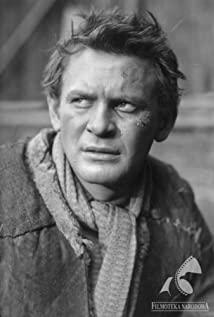The screenwriter Piesivić said that the prototype of the seventh story of "The Ten Commandments" was originally a story of a father and daughter having incest and giving birth to a child. Later, the author made adjustments in the script to make this extreme story. A more relaxed narrative process puts the story between the high school student Meka and his teacher Wattke, and her mother Ava happens to be the principal of this school. In order to cover up the scandal, everyone (Meka and Wattke agreed, and she reported the child's household registration under her own name and became his daughter, named Annie. When Annie was six years old, Meka was already over 20 years old. She was expelled from the school at this time. The specific reasons were not explained in detail in the film, but it is conceivable that the relationship between her and Watke was fruitless. Her child has now become her own sister. Such various experiences may have caused her to face some kind of psychological problems that she can't get through, which is probably the reason why she was expelled. When she grew up, Meka wanted to get her child back. She felt that she was still young and could not make a decision at all. Although she finally agreed to her mother to adopt the child, she still believed that the child was taken away forcibly. However, the mother of the other client completely disagrees with Meka’s doing this. Her ostensible reasons are still the scruples about the family scandal, but from Meka’s point of view, it’s not the case at all. Meka knew that her mother was finishing her birth. She will no longer have fertility afterwards. Adopting Annie is only her selfish consideration. Meka even saw her mother put her own breast without milk into Annie’s mouth, feeding her child like a "real" mother. These make Anne jealous and sad, but now even if she wants to retake Anne, it is no longer an easy task. Not only is her mother's obstruction, Anne is already six years old, she knows that Ava is her mother and Mae Ka It’s just my sister. At the beginning of the film, we showed the existence of this barrier. Anne kept screaming sharply after dreaming of the terrible scene in her dream. Meka walked to the window to try to comfort Anne, but it clearly had no effect. At this time, Ava came over and told Meka with a domineering attitude that you could not comfort her at all. This detail explains the existing estrangement between Meka and Annie. At the same time, from Ava's warning about her daughter's arrogance, it also hints at her awareness of Meka's desire to regain Annie. She tried to stop it, but it was too late. Meka took advantage of the opportunity of a school performance to steal Anne quietly, and took her away from home, and embarked on a journey of escape. The commandment "Don't steal" is prominent in the story, but it is as profound and as ever. Complicated, not simple laws or religious regulations can add The problem to be solved is to be trapped in complex ethical choices and moral dilemmas, so that every character loses the simple right and wrong benchmarks. Just as Kieslovsky said when talking about the "Ten Commandments", When such a situation comes, it has nothing to do with any description or exact definition of right and wrong, but with every specific decision you make. Meka stole her child regardless of the consequences. Legally speaking, she was a steal. Although the child was related to her, Ava, the mother of two children, also viewed this from a personal perspective. The problem, although she said on the phone that she had called the police, it was obvious that this was only a threat to Meka. She knew that once the incident was publicized, it would not only be a simple scandal, but she might also lose her daughter forever. The two daughters were lost together, so Ava tried to stabilize Meka with a delay, but on the other hand kept looking for her. The first stop Maekar went to was to find Anne’s father, Wattke. Now he lives in the country alone and makes a living by making toys for others. Although he helped Maeka lied and tricked his father’s phone tracking, but Obviously Watke was very wary of Meka’s arrival. He also tried to persuade her to accept the facts and return home. He expressed his views or suggestions on this matter completely from his own standpoint, and everyone was out of it. The choices made for their own interests came together, and they were doomed to not have a consistent result, so Meka secretly left Walker's home and took Annie to continue his escape. Just as Kijeslovsky said when talking about the concept of "The Ten Commandments", the film of "The Ten Commandments" did not intend to merely make a modern annotation for the Ten Commandments of Moses. Therefore, every story in it is not only satisfied with the simple connection between storytelling and commandments. In a sense, the role of religious commandments is equivalent to the law. Together, they stipulate people's position in society and stipulate us. What can and cannot be done, but it does not really solve important human problems. Therefore, in the original intention of "The Ten Commandments", Kieslowski abandoned the narration of politics. Instead, it rose to various universal contradictions between people, and used it to explore the politics outside of politics. Factors in human predicament. Specifically in this film, through such an unusual theft story, what we really want to say is how to get along with the people we love. In the film, Meka’s father is a very introverted person. As one of the family members, he only played a few times either to listen to his daughter complaining, or to be dispatched by his wife to find Meka. He obviously has something he likes to want. Did, but in the end he chose to forbear his own needs to complete the concept of "home", The only time he said a lot in the movie was to persuade Ava to understand her daughter's situation. Ava dismissed it and said, "Don't tell me family stories, I know better than anyone else." Then the father said: But you think your daughter is not clear. What he said was very calm, but it hit the nail on the head. Ava herself was impatient, but she kept chatting with her daughter. She didn’t really understand her daughter and knew it well. She repeated it just for the sake of Justify yourself and put all your actions under the name of love. As Keishi said in the creative talk: We always think that we have done many things for the people we love, but when we look back on the past, we will find that although we have done everything for them, we have not Energy or time, hold them in your arms and say a few gentle words to them. This paragraph basically clearly shows the main point of the story. We think that we love so deeply and so exhausted, but in fact, we are doing something that is satisfied with selfish interests in the name of love. Those grandiose and improper. In fact, it is not as considerate and caring as a hug or silent company for a moment, but most of the time we are satisfied with such grandeur, until all the accumulation changes qualitatively at a certain moment. At the end of the film, Ava found her two daughters at the train station. She saw Anne screaming for Ava’s mother, who was supposed to be "grandmother". Sadly, Meka didn’t say anything, and quickly jumped on it. The train, this is a train that she doesn't know the destination, it just represents her mood at the moment, but at a loss. As Ava, it is inevitable that she lost a daughter. At the last moment, she should be full of remorse and realization for Meka's call. Although it is too late for her, this ending is used to show those People who are hurting each other in the name of love are just right. Hold them in your arms and say a few gentle words to them. This paragraph basically clearly shows the main point of the story. We think that we love so deeply and so exhausted, but in fact, we are doing something that is satisfied with selfish interests in the name of love. Those grandiose and improper. In fact, it is not as considerate and caring as a hug or silent company for a moment, but most of the time we are satisfied with such grandeur, until all the accumulation changes qualitatively at a certain moment. At the end of the film, Ava found her two daughters at the train station. She saw Anne screaming for Ava’s mother, who was supposed to be "grandmother". Sadly, Meka didn’t say anything, and quickly jumped on it. The train, this is a train that she doesn't know the destination, it just represents her mood at the moment, but at a loss. As Ava, it is inevitable that she lost a daughter. At the last moment, she should be full of remorse and realization for Meka's call. Although it is too late for her, this ending is used to show those People who are hurting each other in the name of love are just right. Hold them in your arms and say a few gentle words to them. This paragraph basically clearly shows the main point of the story. We think that we love so deeply and so exhausted, but in fact, we are doing something that is satisfied with selfish interests in the name of love. Those grandiose and improper. In fact, it is not as considerate and caring as a hug or silent company for a moment, but most of the time we are satisfied with such grandeur, until all the accumulation changes qualitatively at a certain moment. At the end of the film, Ava found her two daughters at the train station. She saw Anne screaming for Ava’s mother, who was supposed to be "grandmother". Sadly, Meka didn’t say anything, and quickly jumped on it. The train, this is a train that she doesn't know the destination, it just represents her mood at the moment, but at a loss. As Ava, it is inevitable that she lost a daughter. At the last moment, she should be full of remorse and realization for Meka's call. Although it is too late for her, this ending is used to show those People who are hurting each other in the name of love are just right.
View more about Dekalog reviews











